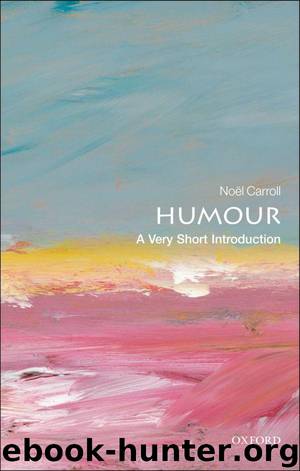Humour: A Very Short Introduction (Very Short Introductions) by Carroll Noël

Author:Carroll, Noël [Carroll, Noël]
Language: eng
Format: azw3
Publisher: OUP Oxford
Published: 2014-01-22T16:00:00+00:00
The neo-Jamesian objection
A more recent kind of objection to the notion on the table—that comic amusement is an emotional state directed at incongruities—may be that it is too cognitive. It would appear to presuppose something like a cognitive theory of the emotions. On the incongruity theory, the comically amused subjects marshal categories, attempt to subsume the object of amusement under said categories, and then enjoy the way or ways in which it slips out of them.
Yet on neo-Jamesian views, of the sort that are steadily gaining traction nowadays, there seems to be too much thinking going on here. As with their forebear and namesake, the philosopher and psychologist William James, for the neo-Jamesians an emotional state is much more like a perception than a cognitive categorization process. It is a non-cognitive, affective appraisal which then elicits a physiological change. Where cognition enters the picture is after the original response, when it functions to monitor and modify the earlier and ongoing stages of our response. Were comic amusement an emotional state, it might be argued, it would not be as intellectual as the incongruity theory of comic amusement presumes. Consequently, comic amusement, if it is analysed by means of the incongruity theory, is not an emotional state.
As a first response, let me protest that even though I accept the scientific evidence that something like the aforesaid scenario describes the most frequent pattern of emotional response, I do not see why neo-Jamesians are so convinced that emotional states never take the trajectory hypothesized by earlier cognitive theories of the emotions. In these theories, some cognitive-evaluative interlude precedes the physiological-feeling stage of the emotion. Aren’t some emotions like that, such as academic envy?
Furthermore, it seems to me that various neo-Jamesian attempts to accommodate these, more apparently cognitively driven, emotional states are suspiciously ad hoc. Jenefer Robinson, the leading neo-Jamesian aesthetician, claims that where deliberation precedes affective appraisal, there is an intervening stage during which our emotional memory system matches our deliberation with previous scenarios or situational types, which memories then elicit bodily appraisals. And this—the bodily appraisal stage—is where the emotion proper starts.
But, to me, there seems to be an extra step here. Why can’t deliberation alone arrive at an appraisal sufficient to provoke a physiological change? Why do we have to be rerouted through emotively charged memory types? It strikes me that only the commitment to a thoroughgoing non-cognitivism makes the move tempting, which, in this context, would amount to presupposing what needs to be shown. So, for the moment at least, I think it is fair to assume that some emotional states are structured in the way earlier cognitive theories of the emotions suggested and that at least some cases of comic amusement can be understood on this model.
Yet what of the remaining cases? Here I think that the incongruity theory of comic amusement need not be thought to be as categorically inhospitable to neo-Jamesianism as may have been suggested thus far.
In order to see how this may be so, consider the two-stage structure of most jokes.
Download
This site does not store any files on its server. We only index and link to content provided by other sites. Please contact the content providers to delete copyright contents if any and email us, we'll remove relevant links or contents immediately.
Spell It Out by David Crystal(36106)
Professional Troublemaker by Luvvie Ajayi Jones(29644)
We're Going to Need More Wine by Gabrielle Union(19028)
The Secret History by Donna Tartt(19014)
Cat's cradle by Kurt Vonnegut(15320)
The Goal (Off-Campus #4) by Elle Kennedy(13645)
The Social Justice Warrior Handbook by Lisa De Pasquale(12179)
The Break by Marian Keyes(9356)
Crazy Rich Asians by Kevin Kwan(9268)
The remains of the day by Kazuo Ishiguro(8961)
Thirteen Reasons Why by Jay Asher(8878)
Educated by Tara Westover(8041)
The handmaid's tale by Margaret Atwood(7744)
Giovanni's Room by James Baldwin(7313)
Win Bigly by Scott Adams(7181)
This Is How You Lose Her by Junot Diaz(6866)
The Rosie Project by Graeme Simsion(6363)
Six Wakes by Mur Lafferty(6229)
The Power of Now: A Guide to Spiritual Enlightenment by Eckhart Tolle(5740)
